- Home
- Norman Mailer
Tough Guys Don't Dance Page 2
Tough Guys Don't Dance Read online
Page 2
“Yeah, baby,” I would murmur to myself, “starved.”
Over these twenty-four days, the Lounge at The Widow’s Walk had become my castle keep. I would sit by the window, study the fire, and watch the changes in the tide, feeling after four bourbons, ten cigarettes, and a dozen crackers with cheese (my dinner!) that I was, at least, a wounded lord living by the sea.
The compensation for misery, self-pity, and despair is that fed enough drinks, the powers of imagination return with force. No matter that they are lopsided under such auspices; they return. In this room my drinks were well stoked by a submissive bar girl doubtless terrified of me although I never said anything more provocative than “Another bourbon, please.” Yet, since she worked in a bar, I understood her fear. I had worked in a bar myself for many years. I could respect her conviction that I was dangerous. That was apparent in the concentration of my good manners. In the days when I used to be a bartender, I had watched over a few customers like myself. They never bothered you until they did. Then the room could get smashed.
I did not see myself as belonging to such a category. But how could I say that the waitress’s dire expectation did not serve me well? I received no more attention than I wanted and every bit I might need. The manager, a young and pleasant fellow, much set on maintaining the tone of the establishment, had now known me for more than a few years, and as long as I had been accompanied by my rich wife, considered me a rare example of local gentry no matter how obstreperous Patty Lareine might get on drink: Wealth is worth that much! Now that I was by myself, he greeted me when I came in, said goodbye when I went out, and had obviously made the proprietorial decision to leave me strictly alone. As a corollary, few visitors were steered into the Lounge. Night after night, I could get drunk in the manner I chose.
Not until now have I been ready to confess that I am a writer. From Day One, however, no new writing had been done, not in more than three weeks. To see one’s situation as ironic is, we may agree, no joy, but irony becomes a dungeon when the circle is closed. The cigarettes I gave up at such cost to my ability to write had, on this last return to the domain of nicotine—it is no less than a domain—cut off all ability to come forth with even one new paragraph. In order not to smoke, I had had to learn to write all over again. Now that I could manage such a feat, the return to cigarettes seemed to have tamped out every literary spark. Or was it the departure of Patty Lareine?
These days I would take my notebook with me to The Widow’s Walk, and when drunk enough, would succeed in adding a line or two to words I had set down in less desperate hours. On those random occasions, therefore, when visitors were actually sharing a predinner drink in the same public room with me, my small sounds of appreciation at some felicity of syntax or my bored grunts before a phrase that now seemed as dead as an old drinking friend’s repetitions must have sounded strange and animal, as unsettling (given the paneled gentility of this Lounge) as cries made by a hound absolutely indifferent to any nearby human presence.
Can I claim I was not playing to the house when I would frown over a drunken note I could hardly read, and then chuckle in pleasure as soon as these alcoholic squiggles metamorphosed into a legible text? “There,” I would mutter to myself, “studies!”
I had just made out part of a title, a bona-fide title, sufficiently resonant for a book: In Our Wild—Studies among the Sane by Timothy Madden.
Now, an exegesis commenced on my name. In Our Wild—Studies among the Sane by Mac Madden? By Tim Mac Madden? By Two-Mac Madden? I began to giggle. My waitress, poor overalerted mouse, was able to flick a look at me only by setting herself resolutely in profile.
Yet I was giggling truly. Old jokes about my name were returning. I felt one rush of love for my father. Ah, the sweet sorrow of loving a parent. It is as pure as the taste of a sourball when you are five. Douglas “Dougy” Madden—Big Mac to his friends and to his only child, myself, once called Little Mac, or Mac-Mac, then Two-Mac and Toomey and back to Tim. Following the morphology of my name through the coils of booze, I giggled. Each change of name had been an event in my life—if I could only recover the events.
In my heart I was now trying to launch a first set of phrases for the initial essay. (What a title! In Our Wild—Studies among the Sane by Tim Madden.) I might speak of the Irish and the reason they drink so much. Could it be the testosterone? The Irish presumably had more than other men, my father did for certain, and it made them unmanageable. Maybe the hormone asked to be dissolved in some liquor.
I sat with pencil poised, my sip of bourbon near to scorching my tongue. I was not ready to swallow. This title was about all that had come to me since Day One. I could merely ponder the waves. The waves outside the lounge-room window on this chill November night had become equal in some manner to the waves in my mind. My thoughts came to a halt and I felt the disappointment of profound drunken vision. Just as you waddle up to the true relations of the cosmos, your vocabulary blurs.
It was then I grew aware that I was no longer alone in my realm of The Widow’s Walk. A blonde remarkably like Patty Lareine was sitting with her escort not ten feet away. If I had no other clue to the profound submersions of my conscious state, it was enough that she had entered with her bucko, a nicely tailored country-tweed-and-flannels, silver-winged-pompadour, suntanned-lawyer—type fellow, yes, the lady had sat down with her sheik, and since they now had drinks in front of them, must have been talking (and in unabashed voices, hers at least) for a considerable period. Five minutes? Ten minutes? I realized that they had sized me up, and for whatever reason, had the confidence, call it the gall, to ignore me. Whether this insularity derived from some not easily visible proficiency the man might call upon in the martial arts—Tweed-and-Flannels looked more like a tennis player than a Black Belt—or whether they were so wealthy a couple that nothing unpleasant ever walked up to them in the way of strangers (unless it was burglary of the mansion) or whether they were exhibiting simple insensitivity to the charged torso, head and limbs sitting so near them, I do not know, but the woman, at least, was talking loudly, and as if I did not exist. What an insult at this beleaguered hour!
Then I understood. From their conversation I could soon divine that they were Californians, just as loose and unselfconscious in deportment as tourists from New Jersey visiting a bar in Munich. What could they know of how they were degrading me?
As my attention went through those ponderous maneuvers of which only a human in deep depression can speak—the brain lurches like an elephant backed into its stall—I climbed at last out of the dungeon of my massive self-absorption to take a look at them, and thereby came to realize that their indifference to me was neither arrogance, confidence, nor innocence but, to the contrary, theatrical to the hilt. A set of poses. The man was highly keyed to the likelihood that a glowering presence such as mine was hardly to be ignored as a source of real trouble, and the woman, true to my premise that blondes believe it obscene not to comport themselves as angels or bitches—each option must be equally available—was stampeding along. She wished to provoke me. She wanted to test her beau’s courage. No mean surrogate was this lady for my own Patty Lareine.
But let me describe the woman. It’s worth the look. She must have been fifteen years older than my wife, and thereby, not far from fifty, but what a splendid approach! There used to be a porny star named Jennifer Welles who had the same appearance. She had large, well-turned promiscuous breasts—one nipple tilted to the east, one stared out to the west—a deep navel, a woman’s round belly, a sweet buoyant spread of buttocks, and dark pubic hair. That was what encouraged the prurience to stir in those who bought a ticket to watch Jennifer Welles. Any lady who chooses to become a blonde is truly blonde.
Now, the face of my new neighbor was, like the porny star, Jennifer Welles, undeniably appealing. She had a charming upturned nose and a full pout on the mouth, as spoiled and imperious as the breath of sex. Her nostrils flared, her fingernails—the Liberation could go screw itself!—were sca
ndalously well-manicured with a silver varnish to catch the silver-blue toning above her eyes. What a piece! An anachronism. The most complacent kind of West Coast money. Santa Barbara? La Jolla? Pasadena? Wherever it was, she must certainly come from an enclave of bridge players. Perfectly groomed blondes remain as quintessential to such places as mustard on pastrami. Corporate California had moved right into my psyche.
I can hardly describe what an outrage this seemed. As well paste a swastika outside the office of the United Jewish Appeal. This blonde reminded me so directly of Patty Lareine that I felt obliged to strike. Do what? I could hardly say. At the very least, gore their mood.
So I listened. She was one immaculately dressed full-bodied lady who liked to drink. She could take them back to back. Scotch, of course. Chivas Regal. “Chivvies,” she called them. “Miss,” she told the waitress, “give me another Chivvies. Lots of diamonds.” That was her word for ice, ha, ha.
“Of course you’re bored with me,” she said to her man in a loud and most self-certain voice, as if she could measure to the drop just how much sex she might be sitting upon. A powerhouse. There are voices that resonate into one’s secret strings like tuning forks. Hers was one. It is crude to say, but one would do much for such a voice. There was always the hope that its moist little relative below would offer something of the same for your preserves.
Patty Lareine had such a voice. She could be diabolical with her lip around a Very Dry Martini (which, of course, count on it, she would insist on calling a Marty Seco). “It was gin,” she’d say in all the husky enthusiasm of her hot-to-trot larynx, “it was gin as done the old lady in. Yes, asshole,” oh, and she would include you most tenderly in this jeer, as if, by God, even you, asshole, could feel all right if you were being kept around her. But then, Patty Lareine belonged to another kind of wealth, strictly derivative. Her second husband, Meeks Wardley Hilby III (whom once she most certainly tried to persuade me to murder) was old Tampa money and she drilled him good but not between the eyes, rather up his financial fundament thanks to her divorce lawyer, a whiz bomb (who, I used to assume to my pain, was probably massaging the back wall of her belly every night for a time, but then, one cannot expect less of a dedicated divorce lawyer—it pays off in presenting the witness). Although Patty Lareine was trim to bursting in her build, and in those days, peppy as a spice jar, he modulated the moxie of her personality down to more delicate herbs. With the aid of intense coaching (he was one of the first to use a video camera for rehearsal) he showed her how to be tremulous on the stand and thereby turn the judgmental eye into—forgive me!—one fat old judge melting away. Before they were done, her marital peccadilloes (and her husband had witnesses) came out as the maidenly mistakes of a desperately beleaguered and much abused fine lady. Each ex-lover appearing as witness against her was depicted as one more unhappy attempt to cure the heart that her husband had shattered. Patty may have begun life as one good high school cheerleader, just a little old redneck from a down-home North Carolina town, but by the time she was ready to divorce Wardley (and marry me) she had developed a few social graces. Hell, her lawyer and she grew equal to Lunt and Fontanne in the manner they could pass a bowl of soup back and forth on the witness stand. One scion of old Gulf Coast Florida money was certainly divested of a share of his principal. That was how Patty came to belong to wealth.
The more I listened to the lady in The Widow’s Walk, however, the more I could discern that she was of other ilk. Patty’s wits were true wit—that was all she had to stand between her and the crass and crude. This new blonde lady now transforming my evening might be short on wit, but then, she had small need for it. Her manner came with her money. If all else was right, she would probably meet you at her hotel-room door attired in no more than white elbow-length gloves. (And high heels.)
“Go ahead, say you’re bored,” I now heard clearly. “It’s to be expected when an attractive man and woman decide to go on a trip. To be thrown together for all these days creates the fear of disenchantment. Tell me if I’m wrong.”
It was obvious that her interest in his reply was less than her pleasure in letting me know that they not only were not married, but were, by anyone’s estimate, on a quick and limited fling. It could wrap itself up on any turn. Taken as a beast on the hoof, Tweed-and-Flannels shouldn’t be too hard to replace for a one-night stand. This lady had a body language to suggest that you would be given one thoroughgoing welcome on first night—only later would difficulties arise. But the first night would be on the house.
No, I’m not bored, Tweed-and-Flannels was telling her now in the lowest voice, not bored at all, his voice droning into her ear like white noise put on the audio system to dull your synapses to sleep. Yes, I decided, he must be a lawyer. There was something in the confidential moderation of his manner. He was addressing the Bench on a point of law, helping the judge not to blow the case. Soothing!
Her text, however, was obstreperous! “No, no, no,” she said, giving a light shake to her ice cubes, “it was my idea we come here. Your negotiations take you to Boston, well then, I said, my whim also takes me. Do you mind? Of course you don’t. Daddy is mad about brand-new mama. Et cetera,” she said, pausing for a sip of the Chivvies. “But, darling, I have this vice. I can’t bear contentment. The moment I feel it, everything says ‘Goodbye, my dear!’ Moreover, I’m an avid map reader, as you have learned, Lonnie. They say women can’t read directions. I can. At Kansas City, way back in—wait, it comes to me—in 1976, I was the only Jerry Ford woman in our delegation who could read a map well enough to drive from the hotel to his headquarters.
“So, there was your mistake. Showing me a map of Boston and its environs. When you hear that tone in my voice, when I say, ‘Darling, I’d like to see a map of this region,’ beware. It means my toes are itching. Lonnie, ever since I was in the fifth grade and started geography studies”—she squinted critically at the melting diamonds in her glass—“I used to stare at Cape Cod on the map of New England. It sticks out like a pinkie. You know how children are about pinkies? That’s their little finger, the one close to them. So I wanted to see the tip of Cape Cod.”
I must say I still didn’t like her friend. He had that much-massaged look of a man whose money makes money while he sleeps. Not at all, not at all, he was telling her, laying his salad oil on her stirred-up little sorrows, we both wanted to come here, it’s truly all right, and more of such, and more of such.
“No, Lonnie, I gave you no choice. I was a tyrant about it. I said, ‘I want to go to this place, Provincetown.’ I wouldn’t allow you to demur. So here we are. It’s a whim on top of a whim, and you’re bored stiff. You want to drive back to Boston tonight. This place is deserted, right?”
At this point—make no mistake about it—she looked at me full out: full of welcome if I took it up, full of scorn in the event I did not reply.
I spoke. I said to her, “That’s what you get for trusting a map.”
It must have worked. For my next recollection is of sitting with them. I may as well confess that my memory is damnable. What I recall, I see clearly—sometimes!—but often I cannot connect the events of a night. So my next recollection is of sitting with them. I must have been invited over. I must, indeed, have been good company. Even he was laughing. Leonard Pangborn was his name, Lonnie Pangborn, a good family name in Republican California, doubtless—and hers was not Jennifer Welles but Jessica Pond. Pond and Pangborn—can you understand my animosity now? They had the patina that comes off a TV screen from characters in a soap opera.
Actually, I began to entertain her considerably. I think it is because I had not spoken to anyone for days. Now, depression or no, some buried good humor in me seemed well rested. I began to relate a few stories about the Cape, and my timing was vigorous. I must have been as energetic as a convict on a one-day pass outside the walls, but then, I was so well on my way to getting along with Pond that it came near to lifting me out of my doldrums. For one thing, I soon divined that she was draw
n to substantial property. Fine mansions on good green lawns with high wrought-iron gates gave her the same glow a real estate agent derives from bringing the right client to the right house. Of course, I soon figured it out. To the money she was born with, Jessica had added her own pile. Back in California she was exactly that, a successful country real estate agent.
What a disappointment Provincetown must have been to her. We offer our indigenous architecture, but it is funky: old fish-shed with wooden-stairway-on-the-outside Cape Cod salt-box. We sell room-space to tourists. One hundred rented rooms can end up having one hundred outside stairways. Provincetown, to anyone looking for gracious living, is no more uncluttered than twenty telephone poles at a crossroads.
Maybe she was deceived by the delicacy of our site on the map: the fine filigree tip of the Cape curls around itself like the toe of a medieval slipper! Probably she had pictured swards of lawn. Instead, she had to look at honkytonk shops boarded up and a one-way main street so narrow that if a truck was parked at the curb, you held your breath and hoped nothing scratched your rented sedan as you went on through.

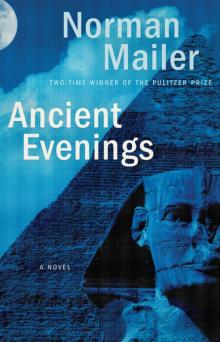 Ancient Evenings
Ancient Evenings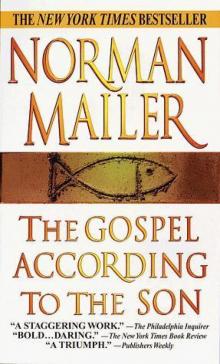 The Gospel According to the Son
The Gospel According to the Son Oswald's Tale: An American Mystery
Oswald's Tale: An American Mystery The Castle in the Forest
The Castle in the Forest The Executioner's Song
The Executioner's Song Why Are We in Vietnam?
Why Are We in Vietnam? The Deer Park: A Play
The Deer Park: A Play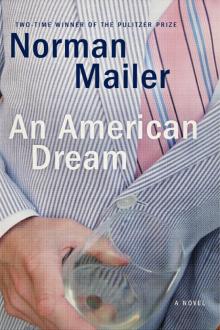 An American Dream
An American Dream Why Are We at War?
Why Are We at War?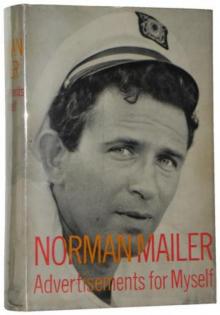 The Time of Her Time
The Time of Her Time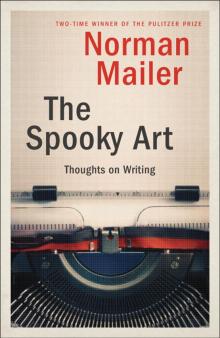 The Spooky Art: Thoughts on Writing
The Spooky Art: Thoughts on Writing Miami and the Siege of Chicago
Miami and the Siege of Chicago Mind of an Outlaw: Selected Essays
Mind of an Outlaw: Selected Essays Barbary Shore
Barbary Shore The Fight
The Fight Harlot's Ghost
Harlot's Ghost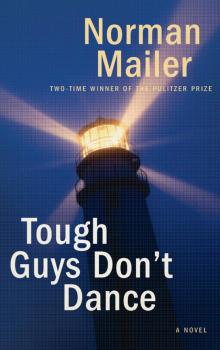 Tough Guys Don't Dance
Tough Guys Don't Dance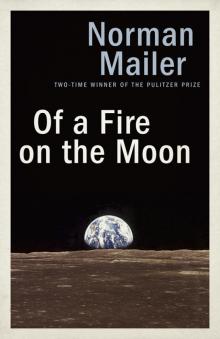 Of a Fire on the Moon
Of a Fire on the Moon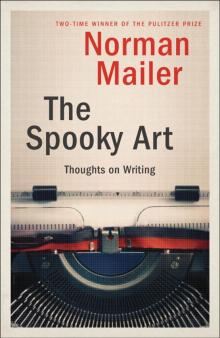 The Spooky Art
The Spooky Art The Deer Park
The Deer Park On God: An Uncommon Conversation
On God: An Uncommon Conversation Mind of an Outlaw
Mind of an Outlaw Oswald's Tale
Oswald's Tale